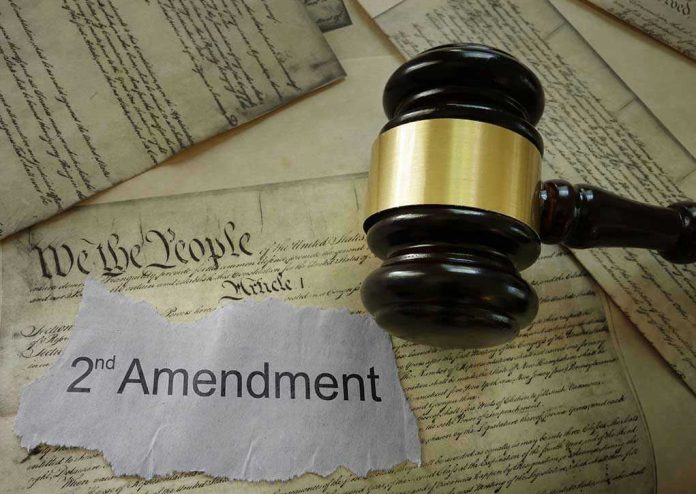
California’s sweeping new ban on Glock-style handguns signals yet another major assault on constitutional rights, as the NRA’s lawsuit sets up a pivotal Second Amendment showdown that could reshape gun ownership nationwide.
Story Snapshot
- California’s new law bans the sale of Glock-style handguns that can be converted to automatic fire, triggering a surge in firearm sales before the ban takes effect.
- The NRA and allied gun rights organizations have filed suit, arguing the law violates the Second Amendment and punishes law-abiding citizens.
- The ban, signed by Governor Newsom, exempts law enforcement and is scheduled to take effect January 1, 2026.
- This legal battle is poised to become a crucial test case with national implications for gun rights and state regulatory power.
California’s Glock Ban: The Latest Front in the Gun Rights Battle
The State of California, long known for its aggressive gun control stance, has enacted AB 1127—a law targeting the sale of Glock-style handguns capable of being converted into fully automatic weapons. Governor Gavin Newsom signed the measure in October 2025, citing concerns over mass shootings and the proliferation of illegal conversion devices. The law responds directly to tragic incidents like the 2022 Sacramento shooting, where a modified Glock-style pistol was used, and to ATF reports showing a 570% rise in confiscated conversion kits from 2017 to 2021. Supporters in Sacramento argue the ban is necessary to curb gun violence and keep up with criminal innovation, especially with the rise of 3D-printed firearm components.
Gun retailers across California have reported an unprecedented rush on Glock-style handguns as customers scramble to purchase before the restrictions take hold. Stores like Red Rifle LTD are selling out of inventory, with many owners voicing concern that the ban targets responsible gun owners rather than criminals. The law’s exemption for law enforcement has deepened frustrations among everyday Americans, who see a double standard—where the state trusts police with these firearms but denies the same rights to citizens. The looming deadline of January 1, 2026, has created uncertainty and legal confusion for gun owners who worry about future restrictions or confiscation, despite assurances that existing firearms may be kept, though they cannot be transferred or sold within the state.
The NRA Fights Back: A Constitutional Test Case
The National Rifle Association, joined by several allied organizations, filed a lawsuit in federal court immediately after AB 1127 was signed. Their core argument is that California’s ban violates the Second Amendment by prohibiting the sale of firearms “in common use” and by effectively punishing law-abiding citizens for the actions of criminals. NRA-ILA Executive Director John Commerford called the law a “flagrant violation of rights,” vowing that it “cannot, and will not, go unchecked.” Legal experts note this case is likely to become a test of recent Supreme Court decisions—most notably District of Columbia v. Heller and NYSRPA v. Bruen—which have clarified and, in some cases, expanded individual gun rights. The outcome could either reaffirm constitutional protections nationwide or embolden other states to enact similar bans.
California officials, on the other hand, present the law as a necessary response to technological advances and a surge in gun violence involving converted handguns. They argue that restricting access to easily modified firearms is a matter of public safety, even as critics counter that criminals can still obtain illegal conversion kits and that the ban does not address the underlying causes of violence. The state’s history of passing strict gun laws, many of which have faced legal challenges, highlights the ongoing tension between state-level regulation and federal constitutional limits.
Broader Impacts: Economic, Social, and Political Fallout
The economic consequences of the ban are already being felt by gun retailers, who face the loss of a significant product line and a sharp drop in revenue once the law takes effect. Manufacturers and distributors may be forced to reconsider their product offerings, potentially shifting business out of California. For gun owners, the law introduces new restrictions and uncertainty, with many expressing worry that further regulations or outright confiscation could follow if the courts uphold the ban. Socially and politically, the issue has deepened the divide between advocates of individual liberty and proponents of expanded government control, fueling polarization across the state and nation.
The lawsuit’s outcome will have far-reaching implications, not only for California but for gun rights debates nationwide. If the courts side with the NRA, it could curtail the ability of states to impose similar bans and reinforce the centrality of the Second Amendment. If upheld, California’s approach could become a template for other states, accelerating the erosion of constitutionally protected gun rights in the name of public safety. As the legal process unfolds, Americans are left to wonder how much further state governments will go—and what it will ultimately mean for law-abiding citizens, conservative values, and the future of the Constitution.
NRA sues California over ban on Glock-style firearms: 'Violates the Second Amendment' https://t.co/VfECqKc3KV #FoxNews
— Fearless45 (@Fearless45Trump) October 16, 2025
Limited data remains on the effectiveness of such bans, as black markets for conversion devices continue to thrive. Both supporters and critics acknowledge unresolved questions about whether these measures stop crime or merely restrict lawful ownership. What is clear is that the fight over AB 1127 has become a flashpoint, symbolizing the ongoing battle over gun rights, government overreach, and the values that define the American way of life.
Sources:
National Rifle Association sues California over alleged Glock ban | ABC7
NRA lawsuit targets California’s ban on Glock-style handguns | Desert Sun














